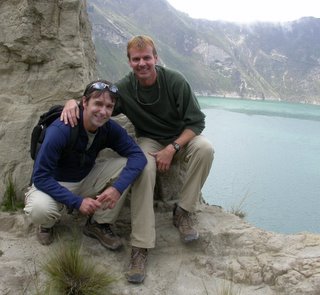Book notes
Three generally disappointing reads on our July camping trip:
"Cross Country" by Robert Sullivan
"Cross Country" by Robert Sullivan
- Evel Knievel got his nickmane in jail in Butte, Montana, and the Sundance Kid got his nickname in jail in Sundance, Wyoming.
We stole glances glances at the corner, at the man who had jumped over lines of Greyhound buses, over rows of Mack trucks, who, not quite sixty at the time, had broken thirty seven bones, including one when he fell in a sand trap and another when he fell in a Jacuzzi.
- Intersting discussion of the use of national parks and tourism to bring the American people closer together, sourced from "See America First: Tourism and National Identity, 1840-1940"
- On his military jet, Tommy Franks had four stars across the headrest of his seat and his wife had four hearts across hers.
- It seems as though "Fiasco," which is just published, will be the military analysis of Iraq that "Cobra II" was not.
- Makes a good case that Japan really wanted to surrender toward the end of WWII, and the primary reason we nuked them was to intimidate the Soviets.
- Kennedy's phoney missle gap has an intersting parellel to Bush's phoney WMD's. Both were cases in which bad intelligance met political opportunism and in which a leader wanted to decieve his opponents into thinking he had weapons he didn't. Kruschev wanted to intimidate the U.S. with claims of many missiles, and Hussien wanted to intimidate Iran with claims of WMD's.
- In January, 1961, the Air Force claimed the Soviets had at least 50 ICBM's and may have as many as 200. They had four.
- "Now we have a problem to trying to make our power credible, and Vietnam looks like the place." -- John Kennedy
- "They begin by lying to Congress and the public, all for the best of reasons; in this case they felt the necessity of containing Communism in South Vietnam. Next they lie to each other, concealing information and even private opinions that might introduce a note of discordant doubt. And finally, they lie to themselves -- having become so profoundly, psychically committed to the wisdom of their actions, having raised the stakes so high, that any admission of error would be a failure of unacceptable dimensions" -- an official describing Vietnam and Kennedy-Johnson.


<< Home